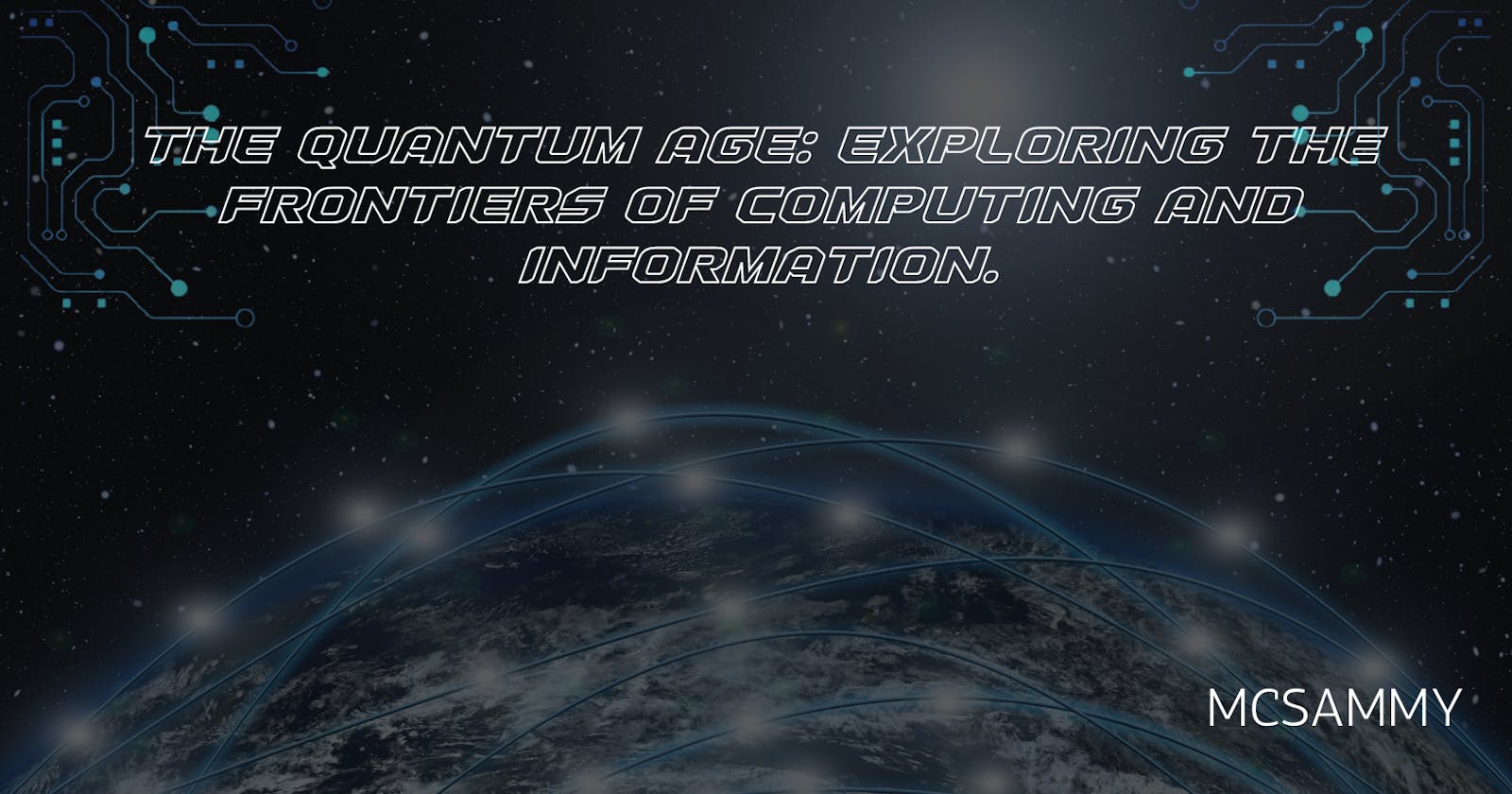Table of contents
No headings in the article.
The Quantum Age has begun, marking a new era in the development of technology. The groundbreaking field of quantum computing and the significant insights it promises to provide in the area of information processing are what define this era. The quantum paradigm opens up a variety of chances to change computation, cryptography, and numerous scientific fields as classical computers approach their physical limits. We examine the main ideas and potential effects of the quantum era in this article.
Understanding Quantum Computing: A Paradigm Shift
In the ever-evolving landscape of technology, few developments in the constantly changing field of technology have the potential to alter our world as drastically as quantum computing. A fundamental shift in how humans process information has been brought about by quantum computing, which promises processing power that could transform companies, scientific research, and cryptography. It's imperative to go into the underlying concepts of quantum computing and how they vary from classical computing in order to fully comprehend the implications of this paradigm shift.
From Bits to Qubits (The Quantum Bit): The quantum bit, or qubit, is the fundamental unit of quantum computation. Qubits use the laws of quantum mechanics to enable them to exist in a superposition of states, as opposed to classical bits, which can only exist in one of two states (0 or 1). As a result, a qubit can be both 0 and 1 at the same time, greatly expanding the state space for computing. Consider a traditional computer as a switch that has two options: on or off. A quantum computer, on the other hand, resembles a dimmer switch because it can support several brightness levels at once. This innate duality is the foundation for quantum computing's promise for parallel processing and amazingly effective problem resolution.
Quantum Gates and Algorithms (A New Language of Computation): Logic gates are used in traditional computing to manipulate bits and carry out calculations. In the same way, quantum computing uses quantum gates to control qubits. However, quantum gates add a new level of complexity and power because of the superposition and entanglement characteristics of qubits. An idea alien to traditional computing, quantum gates enable operations that can concurrently affect both 0s and 1s. These special characteristics enable quantum algorithms to solve issues that are beyond the capabilities of conventional computing systems. Shor's algorithm is one such algorithm that factors huge numbers exponentially more quickly than the most well-known classical techniques. This has important consequences for cryptography because numerous encryption techniques rely on how challenging it is to factor in huge numbers. Advancements in optimization issues, quantum system simulation, and other areas are also predicted by quantum algorithms.
Embracing the Quantum Future: The possibilities are as numerous as they are inspiring as we stand on the verge of the Quantum Age. With the ability to redefine what is computationally feasible, quantum computing could pave the way for innovations in a variety of industries, including artificial intelligence, cryptography, and the sciences of materials and medicine. The transition from classical to quantum computing marks a significant advancement in our knowledge of the cosmos and our capacity to control it for the benefit of society. The Quantum Age promises to be a time of exploration, creativity, and transformation as scientists work to decipher the secrets of quantum mechanics and engineers perfect the technology
Applications Beyond Computation: Beyond its effects on computation and cryptography, quantum computing also has broad effects on several other scientific fields. Researchers can now get previously unreachable insights into the behavior of chemicals, materials, and even biological systems by using quantum simulators to represent complicated quantum systems. This could hasten the development of new drugs, the creation of new materials, and our comprehension of fundamental physical processes. Quantum entanglement, which makes quantum communication possible, promises to build uncrackable communication networks. Information may be sent securely using quantum key distribution since any attempt to intercept the communication would cause the entanglement to break and warn the people involved. This might be used in safe communication, business dealings, and administrative procedures.
Challenges on the Horizon
The Quantum Age is incredibly promising, but there are still many obstacles to be overcome. The maintenance of the delicate quantum states required for computation is one of the most urgent concerns. Quantum computations are seriously threatened by quantum decoherence, a phenomenon wherein quantum systems lose their coherence as a result of interactions with the environment. To deal with this issue, several strategies are being investigated, including enhanced cooling systems and error-correcting codes. The physical development of quantum computers is another barrier. To maintain their integrity, the qubits themselves may be exceedingly vulnerable to outside influences, necessitating the usage of cutting-edge materials and high temperatures. Researchers are looking into several qubit implementations, each with its benefits, such as topological qubits, trapped ions, and superconducting circuits.
The Road Ahead
The Quantum Age is a period of exploration, invention, and discovery, not just a final destination. New research directions will emerge as scientists and engineers push the limits of quantum computing, resulting in innovative discoveries, advancements in technology, and new applications. The Quantum Age has significant and varied potential effects on society, science, and business.
In conclusion, the Quantum Age ushers in a new age in our comprehension of information technology. Quantum computing has the potential to completely alter computation, cryptography, and scientific research, which will change the face of technology and innovation. We're on the verge of a quantum revolution that might change everything when problems are overcome with creative solutions and the limits of quantum information are pushed even further.
REFERENCES
SB3 Global, ‘Exploring the Fascinating World of Quantum Computing’ < https://www.linkedin.com/pulse/exploring-fascinating-world-quantum-computing-s3b-global/\> accessed August 24, 2023.
Dario Gil, ‘ The Dawn of Quantum Computing is Upon Us’ < https://www.ibm.com/blogs/think/2016/05/the-quantum-age-of-computing-is-here/ > accessed August 24, 2023
Techtalkwithnaufiya, ‘ Exploring Quantum Computing:Unlocking a New Frontier In Technology” < https://medium.com/@techtalkwithnaufiya/exploring-quantum-computing-unlocking-a-new-frontier-in-technology-fbaecc823dfc > accessed August 24, 2023.
